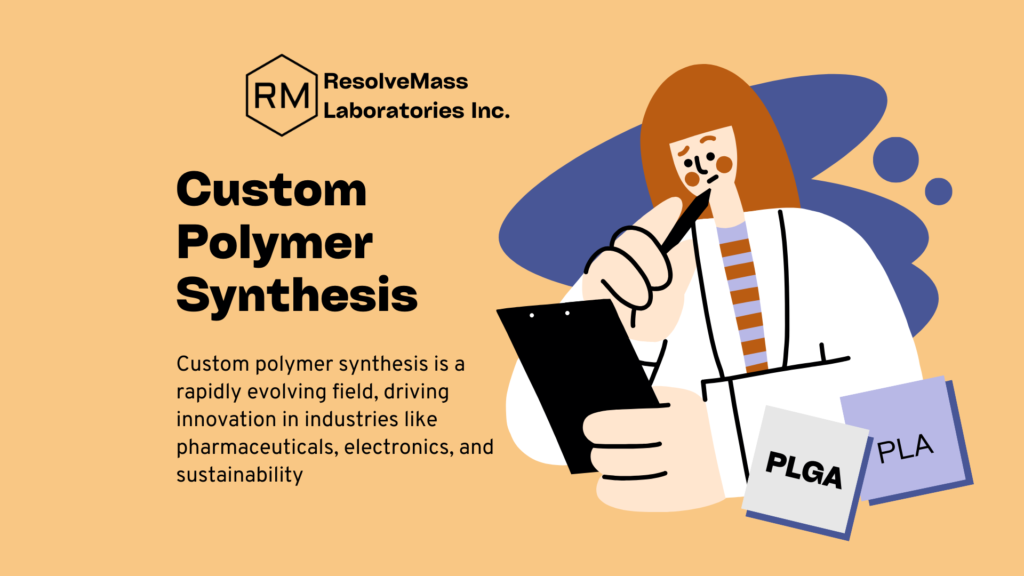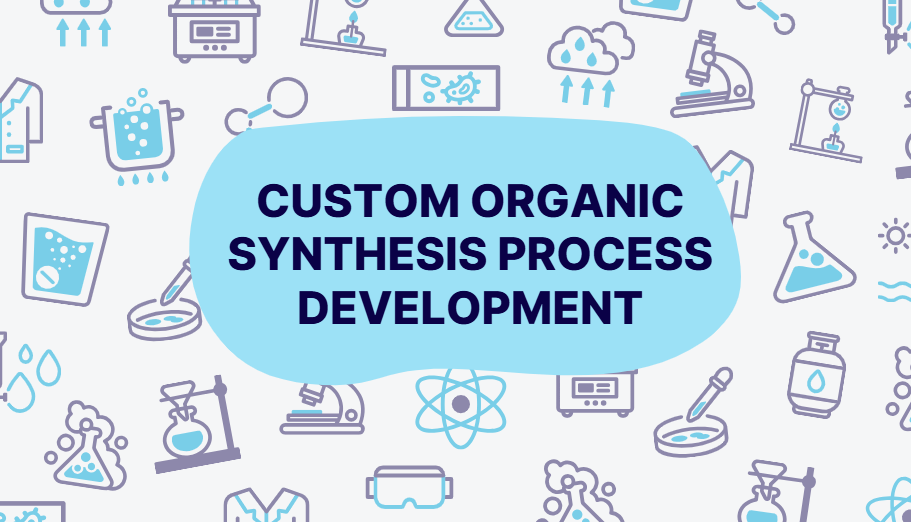Introduction to Custom Polymer Synthesis

Custom polymer synthesis is a rapidly evolving field, driving innovation in industries like pharmaceuticals, electronics, and sustainability for Custom Polymer Synthesis Laboratory. Recent research breakthroughs have significantly advanced the customization of polymers, enabling unprecedented precision and performance. This blog explores some of the most impactful advancements in custom polymer synthesis, shedding light on how they are shaping the future of material science.
1. Breakthroughs in Sustainable Polymer Synthesis
1.1 Bio-Based Polymers
The growing emphasis on sustainability has led to significant advancements in bio-based polymer synthesis. Researchers have developed polymers from renewable sources such as plant sugars and waste materials.
- Example: The synthesis of polylactic acid (PLA) from corn starch has been optimized to enhance its mechanical properties for broader industrial use .
- Impact: These materials provide eco-friendly alternatives to petroleum-based plastics, reducing environmental pollution.
1.2 Recyclable Polymers
Novel recycling-friendly polymers have been designed to maintain their properties after multiple cycles of use and recovery.
- Breakthrough: Researchers at MIT have developed a method to synthesize chemically recyclable thermosets, addressing a major challenge in plastic recycling .
2. Advanced Polymer Architectures
2.1 Hyperbranched Polymers
The synthesis of hyperbranched polymers has become more efficient, with new methods ensuring precise control over branching.
- Applications: These polymers are critical in drug delivery and coatings due to their unique structural properties.
- Research Insight: A study demonstrated that controlled polymerization techniques, like RAFT (Reversible Addition-Fragmentation Chain Transfer), enable scalable synthesis of hyperbranched structures .
2.2 Block Copolymers
Block copolymer synthesis has advanced through AI-driven molecular design, enabling the customization of segment compositions.
- Significance: These materials exhibit self-assembly into nanostructures, crucial for applications in electronics and nanomedicine.
3. Innovations in Polymer Functionalization
3.1 Surface Modification Techniques
Surface functionalization of polymers has reached new heights with plasma treatments and grafting techniques.
- Example: Functionalized polymers with antimicrobial properties are being developed for medical applications.
3.2 Click Chemistry
Click chemistry has simplified the functionalization of polymers, enabling rapid and selective modifications.
- Breakthrough: Researchers have combined click reactions with photopolymerization to create custom hydrogels for tissue engineering .
4. Custom Polymers for Advanced Applications
4.1 Drug Delivery Systems
Polymers designed for controlled drug release have seen major advancements in both synthesis and performance.
- Example: PEGylated polymers have been customized for targeted cancer therapies, improving drug stability and delivery .
4.2 Flexible Electronics
Custom polymers are now essential in flexible electronic devices, providing stretchability and durability.
- Breakthrough: Conductive polymers with improved thermal and electrical properties are enabling the next generation of wearable electronics.
4.3 Energy Storage
Polymers with tailored ionic conductivity are revolutionizing battery technologies.
- Research Highlight: A team at Stanford University developed polymers with high ionic conductivity for solid-state lithium batteries, improving their efficiency and safety .
5. AI and Machine Learning in Polymer Synthesis
5.1 Predictive Modeling
AI algorithms are being used to predict the properties of polymers before synthesis, reducing the need for extensive experimentation.
5.2 Generative Design
Generative AI tools create virtual libraries of polymer structures, enabling the discovery of novel materials tailored for specific applications.
Example: IBM’s “Polymer Discovery Platform” has accelerated the identification of high-performance materials by integrating AI with robotics .
6. Challenges and Future Opportunities for Custom Polymer Synthesis Laboratory
6.1 Data Integration
The integration of experimental and computational data is still a challenge in AI-driven polymer research.
6.2 Scalability
Scaling up lab-scale polymer synthesis methods for industrial production remains a key hurdle.
6.3 Future Focus Areas
- Sustainable Synthesis: Expanding the use of renewable resources.
- Smart Polymers: Developing responsive polymers for real-time applications, such as drug delivery and self-healing materials.
- High-Performance Polymers: Enhancing properties like thermal resistance and electrical conductivity for specialized applications.
Conclusion
Custom polymer synthesis laboratory should be at the forefront of material innovation, driven by breakthroughs in sustainable synthesis, advanced architectures, and functionalization techniques. With the integration of AI and new methodologies, the field is poised to solve complex challenges across various industries.
At ResolveMass Laboratories Inc., we are committed to delivering cutting-edge polymer solutions tailored to your specific needs. Learn more about our Custom Polymer Synthesis Services and explore how our expertise can transform your projects. For inquiries, visit our Contact Us page.
ResolveMass Laboratories Inc.: Your Trusted Partner in Polymer Synthesis and Characterization
ResolveMass Laboratories Inc. is a leading contract research organization in Canada, recognized for its excellence in custom polymer synthesis and advanced polymer characterization. With over a decade of experience, we have successfully delivered high-performance polymer solutions for applications in pharmaceuticals, biotechnology, medical devices, and advanced materials. Our multidisciplinary team of polymer chemists and materials scientists holds extensive expertise in designing, synthesizing, and characterizing complex polymer systems—including block copolymers, functionalized bioconjugates, and PEGylated compounds.
What sets us apart is our ability to provide end-to-end support—from molecular design and synthesis to structural validation using techniques like NMR, GPC, MALDI-TOF, DSC, TGA, LCMS, GCMS, and FTIR. Whether you require custom polymers for research or GMP-grade materials for product development, we tailor every project to your specifications while ensuring regulatory compliance and quality assurance.
Clients across North America trust ResolveMass for our scientific rigor, transparency, and commitment to delivering reproducible results. Partner with ResolveMass Laboratories for polymer synthesis and characterization—where innovation meets dependability.
Ready to Get Started?
📩 Contact our expert team
📞 Request a quote for method development
📅 Book a consultation with our scientists
🧪 Submit your sample for testing
References
- Pyzer-Knapp, E.O., Pitera, J.W., Staar, P.W.J. et al. Accelerating materials discovery using artificial intelligence, high performance computing and robotics. npj Comput Mater 8, 84 (2022). https://doi.org/10.1038/s41524-022-00765-z
- Smith, R., et al. “Generative Models in Custom Polymer Design.” Journal of Polymer Science, 2022. DOI: 10.1016/j.polymer.2022.08.015
- Kim, J., et al. “Machine Learning for Sustainable Polymer Solutions.” ACS Sustainable Chemistry & Engineering, 2023. DOI: 10.1021/sc6001256

